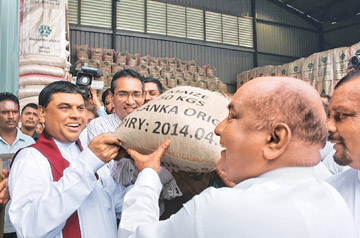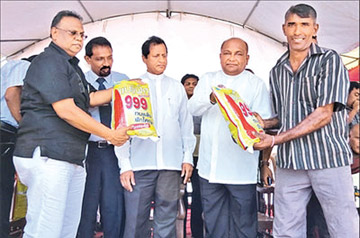Sri Lanka commences maize exports
An agricultural landmark:
Already self-sufficient in maize :
By Shirajiv Sirimane

Minister of Economic Development Basil Rajapaksa was the chief
guest at the ceremony to mark the export of a shipment of 10,000
metric tones of maize for the first time in Sri Lanka. Minister
of Agriculture Mahinda Yapa Abeywardene is also in the picture |

Minister of Agriculture Mahinda Yapa Abeywardene and Managing
Director Wayamba Group S.H. Sadikeen distribute hybrid maize
seeds to farmers at a ceremony in Galenbindunuwewa organised by
the Wayamba Group. |
It was the popular singer Lakshmi Bai, who burning with patriotism
sang 'Adi Sinhalun, Pita Deepa Desha Jayagatta' (Sri Lankans in the
older era conquered the world). However, this export-oriented and
self-sufficient economy was completely ruined by the colonial rulers who
forcibly introduced cash crops such as cinnamon, tea, rubber and coffee
and made the then Ceylon dependent on handouts and imports.
Due to this, today there is a big mismatch between exports and
imports. Though successive leaders ignored this issue, an attempt was
made by former Prime Minister Sirimavo Bandaranaike to make Sri Lanka a
self-sufficient nation.
However, this attempt failed and the idea was dropped for several
decades until President Mahinda Rajapaksa took office.
Under the Mahinda Chinthana program, priority was given to
agriculture once again, making the industry respected. Several private
sector companies too got involved in agriculture and today the fruits of
their labour are evident.
First it was the paddy farmers who re-wrote history again by
exporting paddy. Permanent peace achieved by leading the biggest
humanitarian operation, which resulted in the re-activation of the rice
bowl, and the fertiliser subsidy were keys to this development.
Another noteworthy point to mention is the Divi Neguma program which
makes rural farmers self-sufficient in agriculture.
Another agricultural landmark was created recently when, for the
first time Sri Lanka exported maize.
Minister of Economic Development, Basil Rajapaksa, participated as
the chief guest at the ceremony to mark the export of a shipment of
10,000 metric tons of maize for the first time in Sri Lanka to Taiwan
and Brunei.
Sri Lanka is already self-sufficient in maize.
The country's maize demand is 180,000 MT per year and during
harvesting of the first season a yield of 200,000 MT have been obtained.
Minister of Agriculture Mahinda Yapa Abeywardene also participated in
this event. The initiative was taken by the Wayamba Group.
Govt initiatives
Managing Director Wayamba Group , S.H. Sadikeen said that thanks to
the initiatives made by the Government, Sri Lanka is self-sufficient in
maize now and the excess is now being exported.
"This has helped Sri Lanka earn more than US$ 300 million and most
importantly is helping narrow the import, export deficit." Sri Lankan
maize is being used to produce nutritional foods and also as animal
feed.
Local production of maize was around 190 metric tons and with regular
exports, the production has now increased by around 30 mt.
Due to peace and access to more land for agricultural purposes, this
year Sri Lanka has become self-sufficient in maize production.
It has also created an additional demand which, currently, the
company cannot meet. "This was the reason why we decided to set up this
export village, to increase production," he said.
He said that though it was more expensive for buyers in Brunei and
Taiwan to purchase maize from Sri Lanka, they keep on buying from the
Wayamba Group due to its high quality product.
He said that they have established forward purchasing agreements with
2,220 farmers in the Anuradhapura district giving them a guaranteed
price of Rs. 35 per kilo of maize.
|

Maize flour |
Sadikeen said that export orders have been received from many
countries and his company has also made arrangements to export maize
flour to Japan which would be another historic occasion for Sri Lanka's
agri sector.
Sadikeen disclosed that the Government is fully behind this project
and also provided imported hybrid maize seeds to the value of Rs.10
million distributed on October 6, to over 800 outgrowers who, in turn,
would cultivate over 2,000 acres.
Export villages
"We must thank President Mahinda Rajapaksa, Minister of Agriculture
Mahinda Yapa Abeywardene and Secretary to the Minister W. Sakalasuriya
for going out of the way to help this project," he said.
To increase exports, the company, for the first time plans to set up
an export village in Galenbindunuwewa, Anuradhapura.Sadikeen said that
the Wayamba Group would also invest around Rs. 10 million on this export
village concept which would also include a plant nursery. "This would be
for the first stage and we would re-invest a further Rs. 190 million to
have a processing factory where the company would carry out value
additions in Sri Lanka and re- export," he said.
Minister Yapa said that due to the efforts made by the Government to
encourage farmers to undertake maize cultivation, within a period of
three years Sri Lanka could increase maize production by 168 percent.
The Minister also said that for the development of the country,
public-private partnerships are required and hence the export of these
products has been entrusted to the private sector.Sri Lanka is set to
create another record by exporting both greengram and soya. The irony
was that all these three seed varieties had been imported until very
recently, spending billions of rupees and the pattern is now reversed,
bringing in millions of US dollars and most crucially, providing
self-employment to farmers, bringing them high returns. One of the key
problems faced by the agriculture sector was the unavailability of a
ready-made market and farmers growing these three crop varieties now
have not only access to an instant market, but also a high warranted
price.
|


